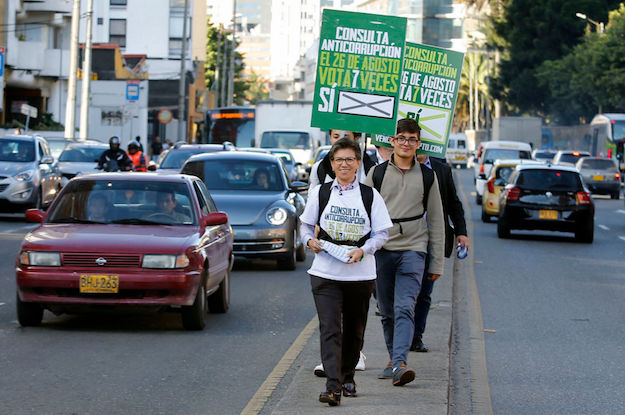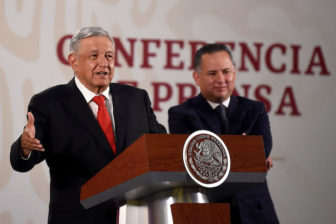Just over two months after choosing a new president, Colombians are headed back to the polls. In a public consultation on Sunday, voters will be asked to weigh in on seven anti-corruption measures that, if approved, would spur sweeping changes to lawmakers’ pay, term limits, business activities, and more.
The stakes of Colombia’s anti-corruption referendum are high: the measures on the ballot aim to curb public and private graft that costs Colombia up to $17 billion per year. But the results aren’t in hand. Here are five things to know about the upcoming vote.
Lawmakers are under pressure
In addition to reducing political perks, the measures up for a yes-no vote on Sunday include mandatory jail sentences for corruption, greater budget transparency, and a three-term limit on public office. An Opinómetro poll published on Aug. 17 found respondents overwhelmingly in favor of the individual proposals. Even if the measures don’t pass, a close vote could put pressure on lawmakers to propose similar anti-corruption legislation on their own, said Giancarlo Morelli, a Colombia analyst for the Economist Intelligence Unit.
The fact that the referendum is happening at all shows that “Colombians are interested in doing politics a different way,” Morelli told AQ. But the short-term effects of the measures may be limited. “These reforms are quite structural,” said Morelli. “Rather than punish the corrupt, these reforms seek to modify their behavior. That adaption is gradual.”
Voter exhaustion could spell trouble
Colombia’s electoral agency took nearly six months to validate the signatures organizers collected in 2017 to bring the referendum to a vote; lawmakers delayed things further to avoid interference with this year’s presidential election. Colombians have already voted three times in 2018 – once for congress plus two rounds of presidential voting – and it’s unclear whether they’ll come out in large numbers for yet another election.
That could prove costly. While each measure would be approved by a simple majority of votes, the results won’t be binding unless a third of all registered voters – more than 12 million people – participate. In the Opinómetro poll, nearly eight out of 10 respondents said they were going to vote on Sunday. Still, some analysts believe the threshold will be hard to meet; less than 18 million Colombians voted in legislative elections in March.
Support is more mixed than you’d expect
Polls put corruption at the top of voters’ list of worries during the presidential campaign. But there’s still resistance to the measures on Sunday’s ballot. Two of them – one on reducing congressional salaries and another on instituting a limit of three terms for lawmakers – would require changes to the constitution, which falls outside the scope of this type of consultation, said Sylvia Sus, a researcher at Congreso Visible, a think tank. This has caused confusion, with some public intellectuals saying they support the consultation but will vote no on those two questions.
“If these two measures are approved, it will generate a good deal of conflict,” Sus told AQ.
Other criticism stems from the consultation’s $104 million price tag. “There’s a lot of people who feel that that’s a lot of money to spend on asking people about corruption prevention,” said Sus.
Fake news has reared its head
False memes and social media posts have attempted to sway opinion on both sides. One widely-shared meme falsely claims that former Senator Claudia López, the referendum’s chief organizer, will earn 5,000 pesos ($1.60) per vote. Meanwhile, former president and current Senator Álvaro Uribe has denounced fake Twitter accounts made in his name to promote the campaign to approve the measures.
The new president showed his independence
Though opposition figures like López and Senator Angelica Lozano are the driving force behind the referendum, newly inaugurated President Iván Duque has expressed consistent support for the referendum. “The fight against corruption doesn’t belong to any political party,” he told CNN after his election. But Uribe, his political mentor, has walked back his support, saying he prefers to pass anti-corruption legislation introduced by Duque. “One wants to play good cop and the other bad cop,” said Sus.
Some of Uribe’s leading allies have also taken back their prior support for the referendum, alleging that the consultation’s organizers are using the vote for political ends.
—
O’Boyle is a senior editor for AQ







